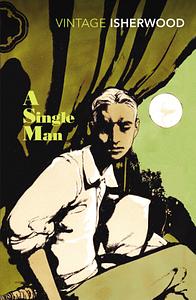Take a photo of a barcode or cover
emotional
hopeful
reflective
slow-paced
Plot or Character Driven:
Character
Strong character development:
Yes
Loveable characters:
Yes
Diverse cast of characters:
No
Flaws of characters a main focus:
Yes
I think the reason I love Isherwood so much is because we seem to share a world-view; poetic about every day life with a touch of cynicism about others that is forgivable because of his self-deprecation. Every word of his is a pleasure to read, and even when George is cruel it is a pleasure. No one can conjure a scene like Isherwood. This is a must-read.
I didn't really think about reading this book. I just did it. I was alerted to it's existence with a beautiful quotation, floating around somewhere on the internet.
"These books have not made George nobler or better or more truly wise. It is just that he likes listening to their voices, the one or the other, according to his mood."
This isn't the one I found, but I'd like to be selfish and keep that one to myself. Besides, we're all here because we love books, and if you're anything like me you'll like books about books even more. I loved George with all his introspection and grumpiness. His grief is a character.
I'd like to be reminded of this book, when I am at the George or Charlotte, not the Kenny stage in life.
"These books have not made George nobler or better or more truly wise. It is just that he likes listening to their voices, the one or the other, according to his mood."
This isn't the one I found, but I'd like to be selfish and keep that one to myself. Besides, we're all here because we love books, and if you're anything like me you'll like books about books even more. I loved George with all his introspection and grumpiness. His grief is a character.
I'd like to be reminded of this book, when I am at the George or Charlotte, not the Kenny stage in life.
The rare case in which a movie is much more interesting than its inspiration. While not long, this novel manages to drag on, echoing the protagonists' own depressive grief-stricken spiral. A homoerotic professor-student relationship and a very 1962 perspective on race are sprinkled in for flavor.
Pretty god awful. Tangential, hardly about the characters, the scenery was vivid enough, but literally everything else was either too abstract or boring. This all strikes me as a bit odd because the movie is an all time fave. So, do yourself a favor and just watch the movie-something I’ve only said one other time-about Dracula.
challenging
emotional
medium-paced
I really loved this book. You really got into the character’s head and I felt an undertone of tension throughout. I also unexpectedly teared up very near the start!
emotional
reflective
sad
medium-paced
Plot or Character Driven:
Character
Strong character development:
Yes
Loveable characters:
Yes
Diverse cast of characters:
Yes
Flaws of characters a main focus:
Yes
George is an Englishmen self-exiled to L.A., an aging college professor quietly grieving his lost love. He and Jim had managed to quietly create a life together for years, mostly away from any sort of harassments or prying. But with Jim gone, George cannot grieve in any outward facing way. In the short span of a day or so, we see inside the mind of George, experiencing the many masks he puts on to perform for himself, for his friends, for the faculty and his students, and for society in general.
It is hard to believe that Isherwood published this novel about the inner life of a grieving, aging gay man in the 1960’s. While literature of that kind was being published, it tended to be dehumanizing, even when published by the likes of Patricia Highsmith. This is the most humanizing work I have ever read that grapples openly with a homosexual perspective in the context of wider human conditions like grief, social performance, aging, mortality, etc. The sexuality is always there but it does not feel either downplayed or sensationalized. It comes up naturally and the perspective in female and male relationships is nuanced.
Isherwood’s prose is wonderful. He does such a good job of creating nuanced perspectives, especially at the beginning and end of the book. As a sort of snapshots of life, it covers so much ground, so many of George’s perspectives and his questions about his own behaviors. A good read regardless of it’s groundbreaking nature.
It is hard to believe that Isherwood published this novel about the inner life of a grieving, aging gay man in the 1960’s. While literature of that kind was being published, it tended to be dehumanizing, even when published by the likes of Patricia Highsmith. This is the most humanizing work I have ever read that grapples openly with a homosexual perspective in the context of wider human conditions like grief, social performance, aging, mortality, etc. The sexuality is always there but it does not feel either downplayed or sensationalized. It comes up naturally and the perspective in female and male relationships is nuanced.
Isherwood’s prose is wonderful. He does such a good job of creating nuanced perspectives, especially at the beginning and end of the book. As a sort of snapshots of life, it covers so much ground, so many of George’s perspectives and his questions about his own behaviors. A good read regardless of it’s groundbreaking nature.




